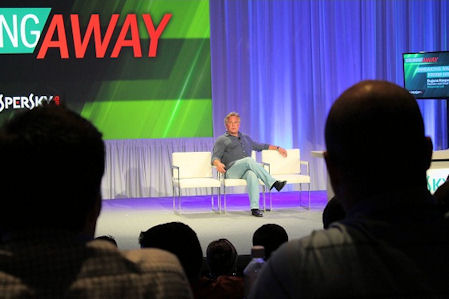CANCUN, MEX. – Security vendor Kaspersky Lab North America announced a doubling of incentives on key products and increased investment in lead generation as part of its annual partner conference on Friday.
Following on the launch last week of Kaspersky Endpoint Security for Business and a new commitment to moving into the enterprise market, the partner program enhancements are focused on partner business efficiency and growing bottom line revenue. Some of the changes include:
* New rewards with a doubling of inventive payments on all Kaspersky Endpoint Security for Business, Advanced and Total platform sales.
* The SE2SE program of monthly education sessions on advanced topics has been revamped to reward technical champions that influence sales. When pre-sales Systems Engineers attend a monthly SE2SE WebEx and pass an exam, they’re eligible to receive a SPIFF payment on any eligible sales that they influence, ranging from $25 to $200 per deal.
* Lead Generation will be a priority, with new resources and budget dedicated to a new digital marketing program to drive more leads to partners. Kaspersky is forecasting a 300 per cent-plus increase on lean gen over the same quarter a year ago.
* A growing library of Kaspersky video assets to help partners demonstrate Kaspersky offerings will now include messaging around positioning offerings in the market.
Kaspersky Lab’s North American president, Steve Orenberg, told partners that, compared to competitors that are diluting their focus with acquisitions, Kaspersky is focused like a laser on improving endpoint security.

Kaspersky Lab president Eugene Kaspersky discusses the threat landscape.
“We feel some of our competitors are diluting their focus by trying to buy and integrate other products,” said Orenberg. “We’re not trying to broaden our portfolio with other solutions; that’s now what we do.”
Orenberg reported that Kaspersky outgrew the security industry for the six consecutive year in 2012, and is forecasting growth of 25 per cent of B2B bookings in 2013. To get there, Garry Kondakov, Kaspersky’s global chief sales and marketing officer, outlined four top priorities for the year ahead. The first is expanding Kaspersky’s business in the corporate market.
“We want to get more aggressive in the enterprise,” said Kondakov. “We’re ready for the enterprise and to do some big things in this market.
The second priority is the channel, enabling partners with new tools and incentives, such as the program enhancements announced, as well as a new focus on co-marketing and marketing collateral that partners can use to bring Kaspersky offerings to market.
The third priority is delivering new services to complement Kaspersky’s main corporate portfolio, and the four is a new push on digital marketing, including deeper investment in lead generation for the channel. Kaspersky wasn’t satisfied with its lead generation program in 2012, and wants to refocus for 2013.
“We had issues with our funnel in 2012. We were focused on particular technologies rather than the foundation of our business, we focused on events which have a high cost per lead, we didn’t focus on digital marketing like we should have, and we had system and process issues that caused us to lose the leads we did get into the system,” said Gary Mullen, vice-president of corporate marketing for Kaspersky Lab North America. “We’re focusing our investment and resources on building a robust and sustainable lead generation system.”
Kaspersky’s level of partner engagement compares very favourably not just to other security vendors, but to many IT vendors overall said David Reid, president and CEO of Winnipeg-based Epic Information Solutions. He’s particularly pleased with their investments in lead generation and customer acquisition activities.
Reid also said he agrees with Kaspersky touting its strict focus on endpoint security as a market differentiator.
“Being true to your core is really important. Some companies in our industry have a tendency to want to try to be all things to all people,” said Reid. “In an area like security you have to be very focused, put your focus into a product set and grow it over time to take on new challenges. That’s an advantage Kaspersky has.”


